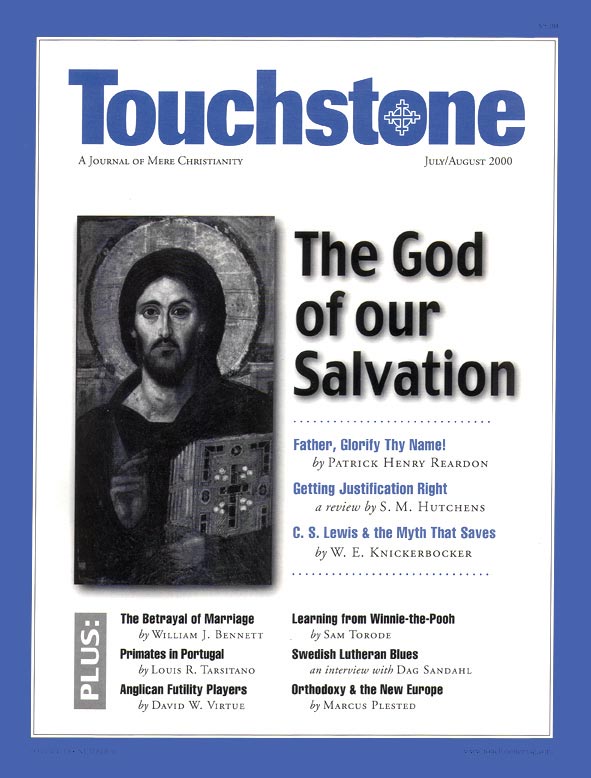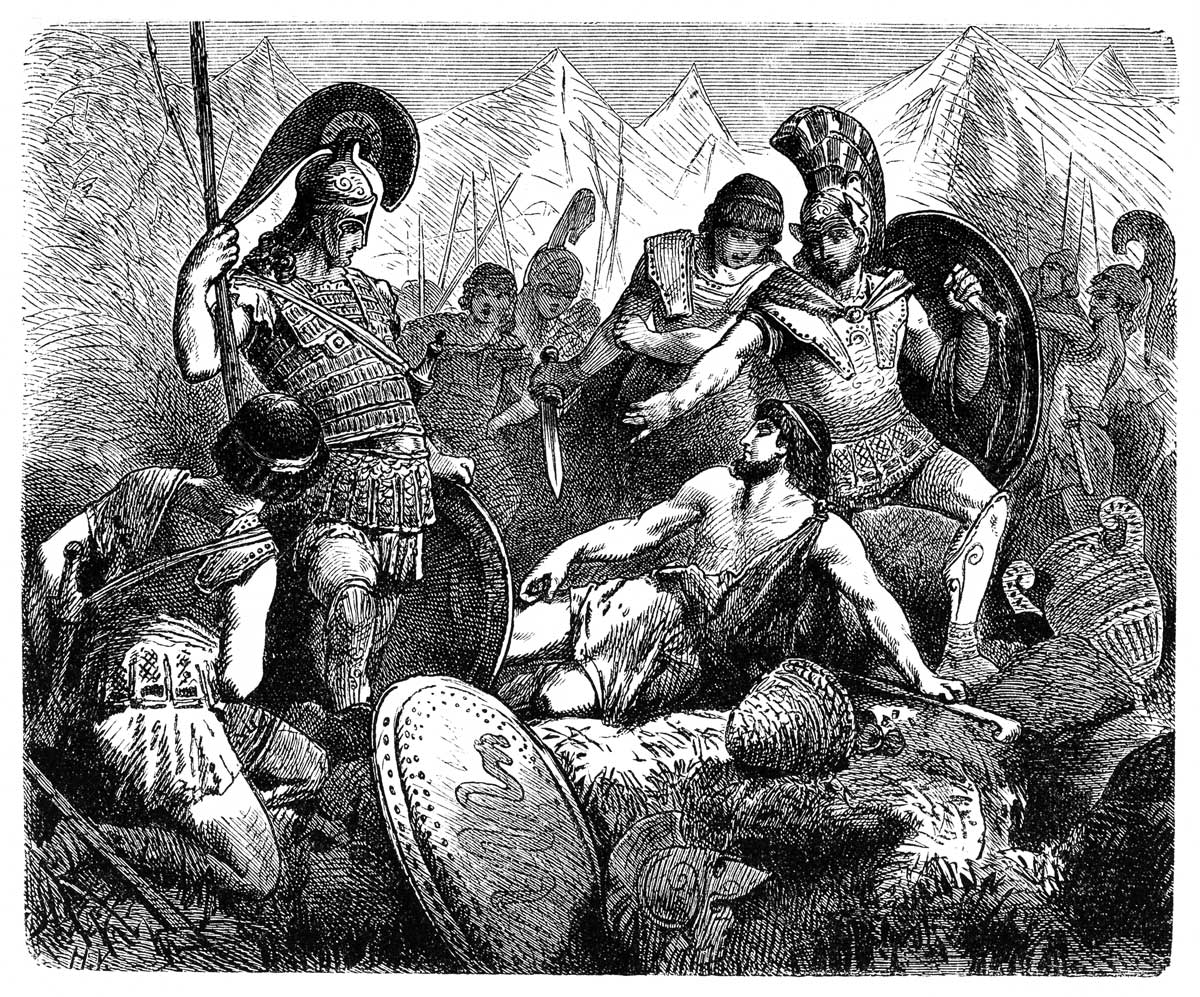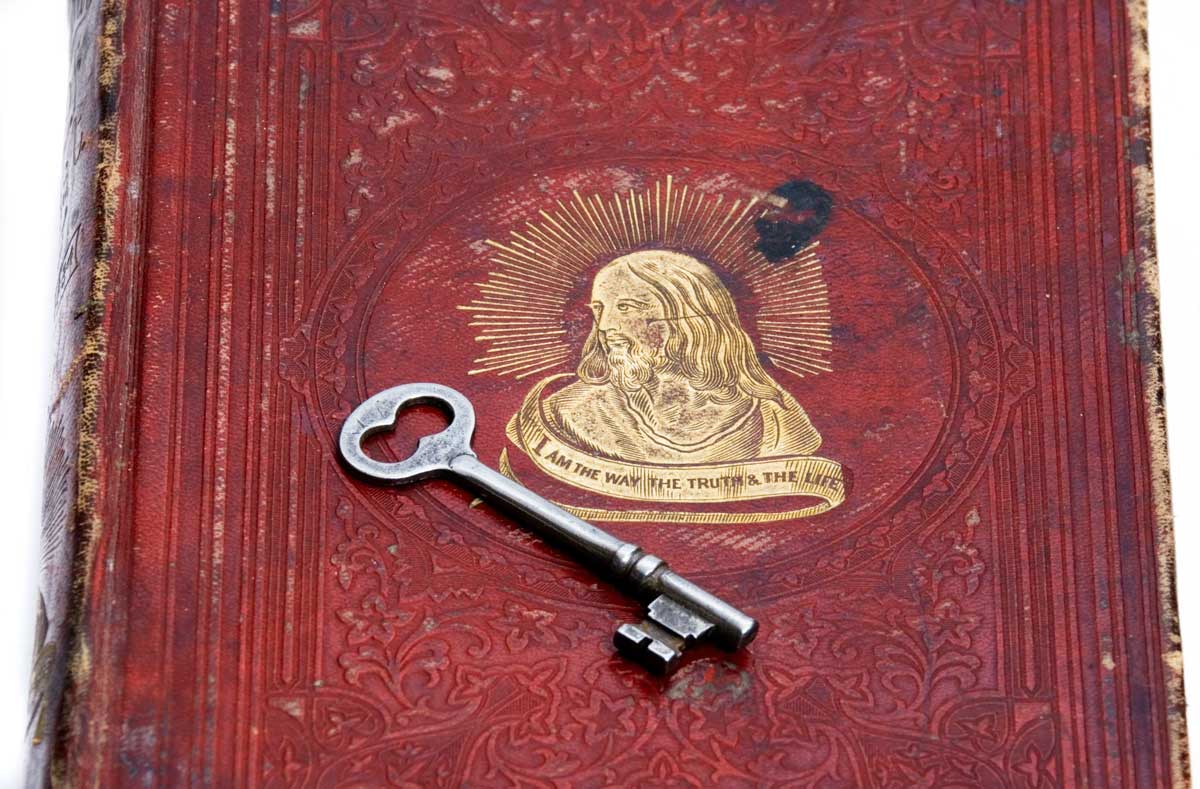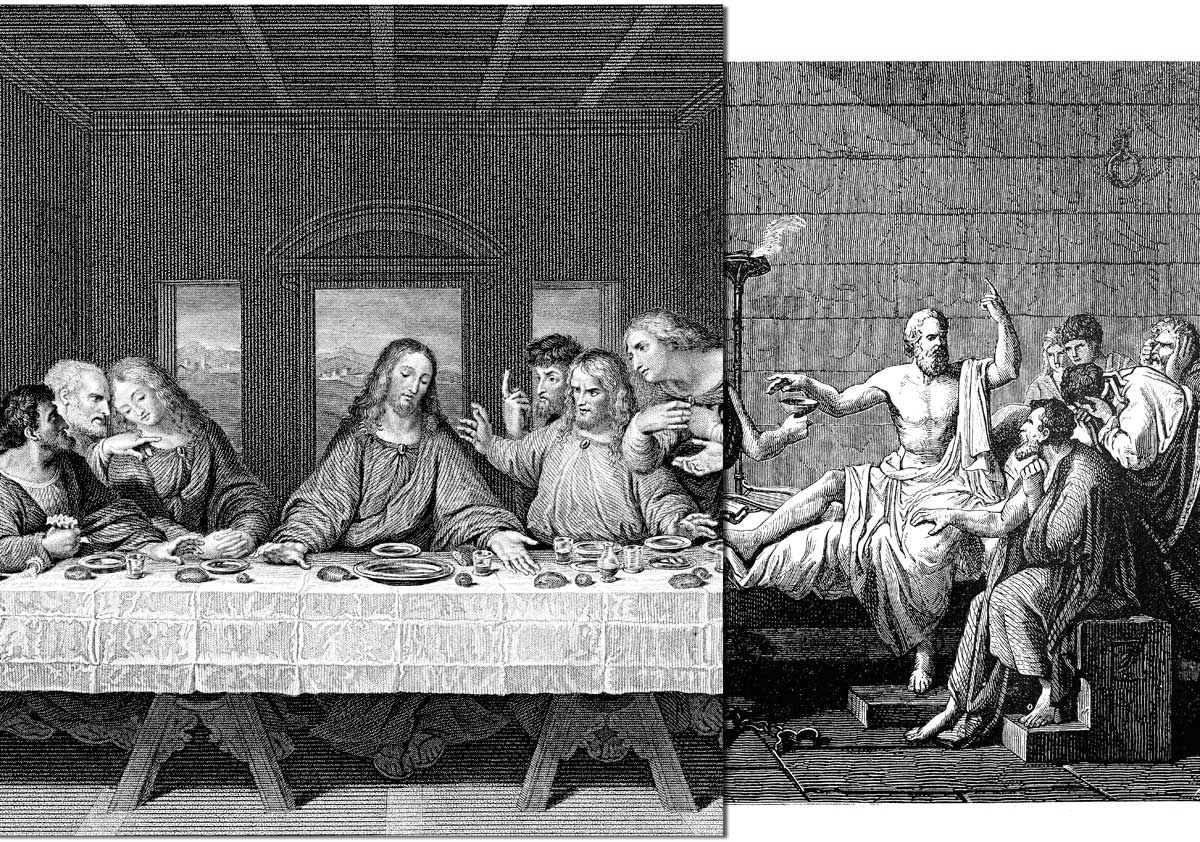Getting Justification Right
Getting the Gospel Right: The Tie That Binds Evangelicals Together
by R. C. Sproul
Grand Rapids, Michigan: Baker Book House, 1999
(206 pages; $16.99, cloth)
Union with Christ: The New Finnish Interpretation of Luther
Carl E. Braaten and Robert W. Jenson, eds.
Grand Rapids, Michigan: Wm. B. Eerdmans Publishing Co., 1998
(182 pages; $21.00, paper)
by S. M. Hutchens
Getting the Gospel Right is a contribution to the long-running and frequently tense conversation about Evangelicals and Catholics Together and its sequel The Gift of Salvation, manifestos produced in the nineties by Evangelicals and Roman Catholics attempting to establish co-belligerency in the public square on the basis of common faith and morals. R. C. Sproul, an influential Reformed theologian, denies these documents can accomplish their stated purpose because Roman Catholicism and Evangelicalism do not share the same faith. Sproul finds no evidence in The Gift of Salvation, which he examines in detail here, that Rome has changed the beliefs the Reformation rejected. He must conclude that their progeny remain divided, not as one group of Christians from another, but as true and false churches.
This is not, he is careful to say, a judgment on the souls of individual Catholics, who may be believers despite the teachings of their church. Rather, it is to say that the Church of Rome lacks one of the vital aspects of a true church—right teaching and preaching of the gospel of Christ. Essential to the gospel, Sproul says, is justification by faith alone, which in turn requires a doctrine of imputed rather than infused righteousness. By teaching that the righteousness whereby we are made acceptable to God is infused into the believer by sacramental grace so that he is made able to merit justification by works, Rome has abandoned the truth: that justification issues from a forensic declaration from God, received by faith apart from works, in which human merit figures not at all.
This reviewer, a Christian who is neither Roman Catholic nor Eastern Orthodox, has spoken to this conviction several times in the pages of this journal. I am confronted with it as one of those ecumenical difficulties whose persistence among Protestants must be acknowledged, but for which I can see no good reason. The gravity of the issue, however, is clearly demonstrated in Dr. Sproul’s exposition. If indeed the Roman Catholic Church is a false church, then the Christian’s duty toward Rome is not to cooperate with her, but to win as many as possible away from her errors and convert them to the true evangelical faith. The Catholic is to be approached much as one would a Mormon or a Jehovah’s Witness, for his mistake is of similar proportions.
If this is the case, also the notion of a “mere Christianity” that may be shared by Protestants, Catholics, and Orthodox is chimerical, for to the degree a man is a Roman Catholic he is not a Christian, and, as the Westminster Confession asserts, in full accord with the logic of this conviction, the head of the Roman Catholic Church must be none other than “that Antichrist, that man of sin and son of perdition, that exalteth himself in the Church against Christ, and all that is called God.” While one may be grateful for the gentlemanly and nuanced tone used throughout this book, for the author’s candid acknowledgment of Catholic virtues, and his hope for the individual Catholic, the belief that stands behind them is that the truly Evangelical and the truly Roman Catholic have no fellowship in the gospel. This is a devastating charge, however politely it is made. It cannot go unanswered, especially by the editors of a journal whose labors are vain if he is correct.
Christ, the Righteousness of God
Sproul outlines the problem clearly. The Gift of Salvation affirms that justification is entirely God’s gift—of “sheer graciousness.” It is forensic—proclaimed by a competent authority, as in a legal forum—since “God, on the basis of Christ’s righteousness alone, declares us to be no longer his rebellious enemies but his forgiven friends, and by virtue of his declaration it is so.” But this, Sproul rightly notes, was never in dispute.
The raging issue of the Reformation was the ground by which God declares us just. The Reformers insisted that the sole ground of our justification is the righteousness of Christ wrought for us in his life of perfect obedience. This is done by imputation. This means that God transfers to our account the righteousness of Christ wrought in his own person and that this righteousness is “counted” or “reckoned” to us by imputation. . . . Rome, on the other hand, believes God will declare just only those who are really just, who are inherently just. . . . Hence the issue was this: Is our justification based on the righteousness of Christ in us or the righteousness of Christ for us? . . . The Reformation doctrine is one of synthetic justification, meaning simply that we are justified by virtue of something added to our person that is not inherently ours. In contrast, the Roman view is one of analytical justification, by which we are declared to be just because analysis indicates we are truly just. . . . (64–65).
If imputation is essential to sola fide and sola fide is essential to the gospel, then manifestly, as long as the doctrine of imputation remains on the table, the gospel lies there with it (82).
The substance of the issue has been cleanly put: “Is our justification based on the righteousness of Christ in us or the righteousness of Christ for us?” My answer would be that the Scriptures teach it is most certainly both, and I would ask why we should be forced to choose one and reject the other. In each case, Christ for us and Christ in us, the righteousness of Christ is alien to man the sinner. But in each case also it becomes truly his own, so that man is justified—Christ’s righteousness is imputed to him—not only forensically, but every bit as much intrinsically, for only the righteous man can act righteously before God—only the worthy can become worthy; only the sanctified (that is, in whom Christ dwells as his righteousness) can be just, as only the justified can become holy.
Forensic justification, the freely given declarative justice of God, cannot be used to exclude intrinsic justification, the righteousness of Christ freely given to the sinner so that he is justified by the work of Christ that becomes his own. God justifies no man apart from Christ, and the declaration of righteousness toward man is in fact the declaration of the righteousness of Christ that is in and for him. This is not simply an abstract righteousness declared because of Christ, but fundamentally the righteousness of God who is Christ himself, “declared,” which is to say, given, on man’s behalf, and in whose fullness redeemed man by grace partakes. The work of Christ is reckoned to him, and he lives in and by that work, which is at all times and places the work of faith, of belief in Christ—not only in the sense of assent, but of actual partaking in the life of the Savior, which is the work of God.
The sinner is not justified externally and then improved internally by sanctification. He is two men at war in a single body, one wholly just and pure, man in Christ, and growing as Christ himself grew, by grace upon grace, to his full measure, the other a sinner who has been, is being, and will be, put to death so that the man in Christ shall live free of him. So far as he is a justified soul, his being and growth is entirely in Christ, in and by the faith and work of Christ, so that justification and sanctification, like faith and works, being first Christ’s, and then wholly redeemed man’s in Christ, cannot be set apart from one another as though they were ever found apart in Christ or in redeemed man.
Both Adam & Christ
The doctrine of grace put forward by the Reformed evangelicalism represented by Dr. Sproul is Christologically deficient, and so to be energetically rejected by faithful Christians. While it correctly recognizes salvation as preeminently the work of God, it does not sufficiently recognize that it is also the work of man since it is the work of the God-Man in whom the redeemed live. In the understandable and praiseworthy intention of making sure that it attributes nothing to man who in sin and finitude is helpless to save himself, it slights man in his perfection and divine power who through obedience cooperates with the Father in the salvation of man, that is, Christ, and those whose life is hidden in him.
The doctrine of justification by faith alone apart from works is an attack not only on an orthodox doctrine of salvation, but on orthodox Christology and anthropology as well, since it divides the faith of Christ, by which we are justified, from the work of Christ, by which also we are justified, misplacing the justifying work of Christ in man, as well as the works of Christ that the man of faith receives as his own. Those who propose it habitually confuse the works of the law, by which St. Paul teaches that no man is justified, with the work of Christ in us by which both Paul and James assure us that we are, and in which their teaching on justification is one. So fearful are they that a justifying work might be attributed to unjust man that they cannot attribute the work of Christ to a just one. None of the works of the just are therefore the works of justification, but merely those of becoming better (sanctification), when in fact the “becoming better” is also justification since it is growth not simply toward, but in the righteousness of Christ. It cannot be one without being the other as well.
The center of the point of contention is not Christ himself, but man in Christ, who partakes of his being, and hence has himself a divided nature while still in the flesh, as St. Paul teaches in Romans 7. The doctrine of simul justus et peccator, while formally correct, is misleading when it is read in accordance with abstract concepts of righteousness and sin, instead of meaning that man as the object of salvation is at once Adam and Christ. As Adam he is lost and helpless; in Christ, through true obedience to the Father, he is not: his cooperation in his salvation is true co-operation, his person is truly, by substitution, but still truly, that of Christ, and because of this, grace frees him to merit what he undeservedly receives. He is Adam and Christ, disobedient and helpless on one hand and obedient and full of grace and its power to obey on the other. As in the character of such paradoxes, any combination, mixing, or separation of the categories produces error.
The End of the Protestant Adventure
The Reformers’ reasonable dread of the conceit that sinful man could earn his salvation by purchasing (that is, obtaining by dint of his own labor) the merits of Christ and the saints—an unwholesome mixing of the sinner and the righteous man, and itself an assault on Christology—issued in a reaction in which there was no longer a way in which even man in Christ could co-operate in his own salvation. The sacraments of baptism and the Lord’s Supper, preeminent tokens of the incorporation of helpless men into the very life of Christ, began to become problematic among those who grasped in its fullness the novel principle of justification by faith alone, for when all that is needed for justification is faith, then the sacraments, and indeed the community in which they must by their nature be given, become optional, and considerable theological labor became necessary to retain them as meaningful. “Faith alone” has unavoidably solitary tendencies.
The sacramental system, as soured as it becomes when subject to magic and priestcraft, enshrined a doctrine of the Christian’s participation in Christ that allowed the deepest meaning to his works and therefore the deepest significance to the daily actions of his life. Among those who were able to receive it, it kept the world sacramentally enchanted, and kept a man in holy fear, for it was a place where he could be justified by works of faith, and in which therefore what he touched and did and made had metaphysical roots that reached into the very life of God. The Protestant, concerned with justification by faith alone apart from works, has always been plagued by dichotomies of act from belief, of body from mind, of sacred from secular. He has always had to be at pains to remind himself of relations, dependencies, and hierarchies in which his division of faith from works has made discernment more difficult than it needs to be. He believes, for example, that Christ is King and Bishop, but his tendency has been to throw down all other kings and bishops because they are not Christ. This rests, I would argue, on his deep and by now engrained belief that the work of God and the work of man are two quite different things, without taking proper account of how they may be one in Christ.
Thus also was the way opened for potentially infinite division in the churches through the loss of pastoral authority, for a man who is saved by faith alone needs an authoritative church and its pastors no more than he needs its sacraments. Individualism and ecclesial fragmentation is the logical end of the exclusive assertion of justification by faith alone. As soon as justification through incorporation in Christ, and hence into both the faith and works of Christ, is fully accepted, the Protestant adventure as we have experienced it for the last five hundred years is at an end, the sacraments naturally reassert themselves as means of grace for those who believe, and the Church and its true pastors begin to look important again.
Faith Is a Work
Perhaps the most important seat of doctrine for justification by faith alone apart from works is St. Paul’s teaching in the second chapter of Ephesians that “By grace you are saved through faith, and that not of yourselves, it is the gift of God, not of works, lest any man should boast.” Here, however, and in similar passages, Paul is speaking of the works of the law, by which all Christians agree that no one can be justified before God. He is speaking of Adam, who is indeed helpless to save himself. This statement, however, is wrenched from its context when the Christological explanation that follows is omitted:
For we are his workmanship, created in Christ Jesus for good works, which God prepared beforehand, that we should walk in them. . . . But now in Christ Jesus you who once were far off have been brought near in the blood of Christ. For he is our peace, who has made us both one, and has broken down the dividing wall of hostility by abolishing in his flesh the law of commandments and ordinances that he might create in himself one new man in the place of two.
The new man is Christ, and the believer lives in him by an act of redemption that is also an act of creation in Christ, and so of adoption in the Father, in whose whole self the believer partakes. He will be, in this partaking, never less than himself, but in the mystery of Christ’s being he may now talk of his own being as he talks of that of Christ. This talk is full of paradox. The believer in Christ is in time, but also has a timeless dimension; he is flesh, but his flesh is beholden to resurrection and transformation; he is the man who he is, but he is also related to God through Christ as a very son of God (the Orthodox say that he undergoes theosis). He is, as was Christ on the cross, simul justus et peccator, the man upon whom sin is laid, but who knows no sin. While the distinction between the Father and the Son is maintained, as between the Son and those who are in him, each participates in the other in the manner proper to his derivative order of being, one through begottenness of the Father, and the other in that begottenness through “creation in Christ Jesus,” and thus through adoption by the Father.
In this scheme the problem of saying that faith comes first, then works, is the problem of the order of faith and works in Christ. A man can neither exercise faith nor perform works that are pleasing to God apart from the grace of God in Christ—all faith that is true and all works that are good are faith and works in Christ. We may ask, in Christ, then—Christ as the eternal Son of the Father, incarnate from the Holy Ghost and the Virgin Mary—which comes first, faith in God or the works of God—faith in the Father, which becomes by gracious donation our faith, or the works of the Father in Christ, by which we are saved? I cannot say, and do not think it can be said. Faith is never apart from the Act of the Faithful, so the acts of the faithful are never apart from faith. Faith is a work, every true work is a work of faith, and the attempt to place these in strictly chronological order in Christ involves one in infinite regress.
An Error at War with Scripture
What many Protestants have done, faced with the realization that faith is never apart from a work—even if it is the movement of the mind that gives rise to the intention to believe—is define the faith and works of Christ together as “faith.” This way one can encompass saving faith and its most elementary work in the definition of “faith.” When this is done, one can be saved by faith alone without recognizing the movement of faith as a work. The credibility of this fusion is found in what Seeberg recognized as Luther’s discovery of the fundamental quality of faith in Christian life. Faith may indeed be viewed as the disposition from which good works arise, and in that sense is prior to them. But the priority of faith in Christ is not analogous to that of creator and ex nihilo creation, but as begetter to begotten. One is primordially contained within the other, so that while one may be conceived as prior and the other follows after, it may not be said that one is ever without the other—that there is faith first as a pure quality that does not contain executed work, and then there arises from this pure and singular quality, as from nothing, the works of faith. (This is what James meant when he pointed out the deadness of faith apart from works— pistis choris ergon.) One cannot speak of the reception of faith without also speaking of the work necessary to exercise or appropriate it. Even the most passive receipt involves a reception, a work, that is contained in the nature of the receiver.
Faith itself is a work and cannot be meaningfully spoken of in any other way. When a man asks what he must do to be saved, he is told that he must believe on the Lord Jesus Christ, not as though the believing and the doing were two different things, but one, for the work of God is to believe on him whom he has sent. When the evangelist preaches that men must be reconciled to God, and they ask him how, the answer is always to do something. A great irony is that many of those who vigorously deny the catholic doctrine of faith and works are active in an evangelism where the first word to those who would be saved is “accept,” as though acceptance were faith and no work. (Acceptance is the whole labor of Christian life!)
To divide justifying faith and works in time as though the first exercise of faith was without works while subsequent works may be performed in faith is precisely what James was denouncing when he taught that faith cannot be abstracted from works: “Show me your faith apart from your works, and I by my works will show you my faith.” There is no support whatever in this passage for those whom it has forced to admit that faith and works must always be together, that faith must be demonstrated in works, but still will not straightforwardly confess that “a man is justified by works and not by faith alone,” for in order to say this, as James does, justifying faith and works, while two, must also be one. Since formal Protestant theology has historically denied this in its doctrine of grace, in this place it is in error and at war with the Scriptures on which it claims to be founded.
The chief conceptual problem here would seem to involve time, which at the point of justification becomes aoristic, suffused with eternity. The act of justification conceived with the aid of the judicial metaphor must comprehend past, present, and future, as must the act of justification conceived sacramentally (that is, in reality) as infusion with Christ himself. In each case our being is hidden with Christ in God, and carried along with him both into and out of our temporal sight, since the Spirit, of whom believers are born, is perceived by us in time, but we cannot discern his whence or whither, his temporal actions in the justification of sinners arising from the supertemporal Act—the Word of God who is the Mystery of God Incarnate—which we must conceive under the limitations of space and time. Our faith and good works, being in Christ, are drawn in Christ out of our sight, into the life of God.
Lutherans & Theosis
I do not believe this forces subscription to the traditional Roman Catholic economy of papal and ecclesiastical administration of the merits of Christ. This writer joins Christians outside the Roman Communion in skepticism about much that is connected with its practical and pastoral interpretation of Christ’s donation to Peter. Being formally correct, however, on the basic relations of faith and works, Rome (with Eastern Orthodoxy) has retained something of what Protestantism needs to regain. We will continue to dispute on how to speak of the infusion of Christ’s righteousness, on treasuries of merit under priestly control, and the like. We should not, however, dispute on infusion itself, that is, Christ in us by the donation of grace, our righteousness and hope of glory. Nor will it be necessary, once the seas in this area are somewhat calmed, to raise fundamental questions about the Christianity of Catholicism based upon the accusation that a false gospel of analytical justification is of its essence.
Support for this understanding has recently arrived from Lutheran (!) quarters. Carl Braaten and Robert Jenson have gathered a number of articles and responses representing the new Finnish school of Luther interpretation into a slim but volcanic volume entitled Union with Christ. This is a book I had to read twice, since on the first pass I could hardly believe it said what it did. If the Finns are right, Luther wasn’t a Lutheran, having been misconstrued not only by modernizing neo-Kantian Lutheranism of the Lotze-Ritschl tradition, but by the major Lutheran confessions themselves. The admission by Jenson that “As a systematician, I have found I can do very little with Luther as usually interpreted. . . . With Luther according to the Finns, on the other hand, there can be much systematically and ecumenically fruitful conversation” will come as no surprise to those who have read his Systematic Theology, but with such remarks the seismic needles of the theologian begin to tremble.
The discovery was that of Tuomo Mannersmaa and his colleagues, who, in the search for a standpoint for ecumenical discussion with Eastern Orthodoxy, detected a commensurability of Luther’s teachings on union with Christ with the Orthodox doctrine of theosis. Thus Professor Mannersmaa:
According to Luther, Christ (in both his person and his work) is present in faith and is through this presence identical with the righteousness of faith. . . . A difficult problem for Lutheran self-understanding arises, however, from the Formula of Concord’s definition of the relation between “justification” and “divine indwelling”; this is different from that found in Luther’s theology. . . . In the Formula of Concord, “justification by faith” merely denotes the forgiveness of sins “imputed” to a human being on the basis of the perfect obedience and complete merit of Christ. But the inhabitatio Dei is distinguished conceptually as a separate phenomenon that is logically subsequent to justification. . . . Justification is understood here in a totally forensic manner, that is, it is regarded as a reception of the forgiveness that is “imputed” to a human being. . . . The Reformer’s notion of the “righteousness of faith” is permeated by christological thinking. Luther does not separate the person of Christ from his work. . . . justifying faith means participation in God and in Christ’s person. . . .
In contrast to Luther, justification and the indwelling of God in the believer are conceptually separated from each other in the Formula of Concord. Justification is only the forgiveness of sins. The indwelling of God follows in a logical sense after justification. One must ask here whether what Luther considers damning for the believer to think is exactly what the Formula of Concord calls sound doctrine; in the locus of justification the divine person of Christ is separated from the person of the believer, because justification is only a forensic imputation and does not presuppose the divine presence of Christ in faith (pp. 25–39, passim).
The point is drawn with metaphysical precision by Sammeli Juntunen in his observation that for Luther the “being of grace” is participation in Christ, “who comes into a very intense union with the believer, but who nonetheless remains his own substantial reality without becoming part of the essence of the believer or being reduced to an accident in this essence” (pp. 154–155). Luther, he observes, regards this participation as so ontologically intense
“that the actions which Christ works in a Christian can be considered the actions of this Christian in question himself. . . . Christ does not work in a Christian only as an extrinsic ‘power’ [Macht], but also as the principle of spiritual being and spiritual action who gives himself to the Christian in such a way that Christ becomes intrinsic in the Christian. It is understandable, then, that Luther can speak about the cooperatio of the believer with God in the spiritual realm of existence and, at the same time, claim that a person is always spiritually nihil ex se” (pp. 155–156).
One will here recall Professor Sproul’s charge that Rome believes God will declare just only those who are inherently just, and makes the issue between Protestants and Catholics—in which he charges the latter with abandoning the gospel—turn on the question of whether “our justification [is] based on the righteousness of Christ in us or the righteousness of Christ for us.” Clearly the Finnish theologians think the question was nothing of the sort for Luther himself, and, if that were not enough, at least one of them suggests that posing the question in this way and answering it as Sproul, the Formula of Concord, and post-Kantian epistemological skepticism have, would be regarded by the Reformer not only as incorrect, but as damning.
Reforming the Reformation?
Are the Finns right about Luther? Dennis Bielfeldt’s comments on the Juntunen essay apply, I think, to the whole project: Luther’s corpus is huge, and what the Finns have tried is that which has been attempted so often by theologians,
“the difficult task of synthesizing into a systematic position key passages sprinkled throughout these texts. It is so easy for those with a systematic-dogmatic approach to purchase Luther’s theological consistency at the expense of his text’s own theological tensions, ambiguities, and imprecision. Given the strukturierenden Idee of deification, it is not surprising to find Juntunen finding in Luther an ontology in which divinization plays the central role” (p. 166).
I will put it more bluntly: Luther did not grasp the contradiction in his understanding of salvation as union with Christ and his belief in justification by faith alone. These doctrines lodged in regions of his mind that were insufficiently acquainted with each other—a common problem among those as intricate and capacious as he.
The Finns have shown to my satisfaction that Luther’s conception of union with Christ contained within it a positive understanding that Christ’s person and that of the Christian are related in such a way that justification may be said to be not merely forensic, a matter of Christ for us, but intrinsic—Christ in us—as well. But in other places Luther demonstrated that he badly misunderstood the gospel, particularly in his failure to distinguish sufficiently between the works of the law, which do not justify, and the works of faith—the works of Christ in the redeemed, which are by grace verily his own—which do. This is made clear by his persisting inability to reconcile Paul and James.
Luther’s theological legacy was burdened from the beginning with the Christological deficiency I have mentioned in connection with Dr. Sproul. Later Lutheran systematicians seized upon its characteristic formula as not only the unique contribution of Luther to Christian theology, but as a “structuring idea” of Lutheran dogmatics so that justification by faith alone became the article by which they attested the Reformation stands or falls. If this is the case, then the Reformation falls. This is the reason why the new Finnish interpretation of Luther is so fascinating. While it is very unlikely that the Finnish theologians will succeed in reforming Luther, they are certainly doing their part in reforming the Reformation.
Once again, I am not defending Roman Catholicism as an essentially papal-sacerdotal dispensation of grace—its views of infused righteousness, of condign and congruous merit, of treasuries of merit under priestly control, of ex opera operato transference of baptismal grace, and so forth—the majestic, intricate, and compelling monolith of the Roman Catholic strukturierenden Idee. It does appear to me, however, that Catholicism and Eastern Orthodoxy intuit a human dimension of salvation, tied to the humanity of Christ indwelling the Christian, that Protestantism, at least in its more formal theological expressions, tends to lack. Since the sacraments stress, in baptism, incorporation of man into Christ and, in the Lord’s Supper, union with him, sacramental life provides a strong presumption of identification of the sinner with Christ lacking in theologies where grace is conceived less as a person than an abstract donatum resulting in personal faith, then good works, rather than the receiving of the whole with Christ himself by regeneration in the womb of the Church. Much Protestant division originated in the pietist-revivalist-communalist-charismatic reaction to the remoteness of Christ and the Church encouraged by such views. Monsignor Knox’s enthusiast is very often a man with catholic instincts whose Protestantism denies him the consolation of the sacraments and the formative authority of Mother Church.
S. M. Hutchens is a senior editor and longtime writer for Touchstone.
subscription options
Order
Print/Online Subscription

Get six issues (one year) of Touchstone PLUS full online access including pdf downloads for only $39.95. That's only $3.34 per month!
Order
Online Only
Subscription

Get a one-year full-access subscription to the Touchstone online archives for only $19.95. That's only $1.66 per month!
bulk subscriptions
Order Touchstone subscriptions in bulk and save $10 per sub! Each subscription includes 6 issues of Touchstone plus full online access to touchstonemag.com—including archives, videos, and pdf downloads of recent issues for only $29.95 each! Great for churches or study groups.
Transactions will be processed on a secure server.
more on theology from the online archives
more from the online archives
calling all readers
Please Donate
"There are magazines worth reading but few worth saving . . . Touchstone is just such a magazine."
—Alice von Hildebrand
"Here we do not concede one square millimeter of territory to falsehood, folly, contemporary sentimentality, or fashion. We speak the truth, and let God be our judge. . . . Touchstone is the one committedly Christian conservative journal."
—Anthony Esolen, Touchstone senior editor












